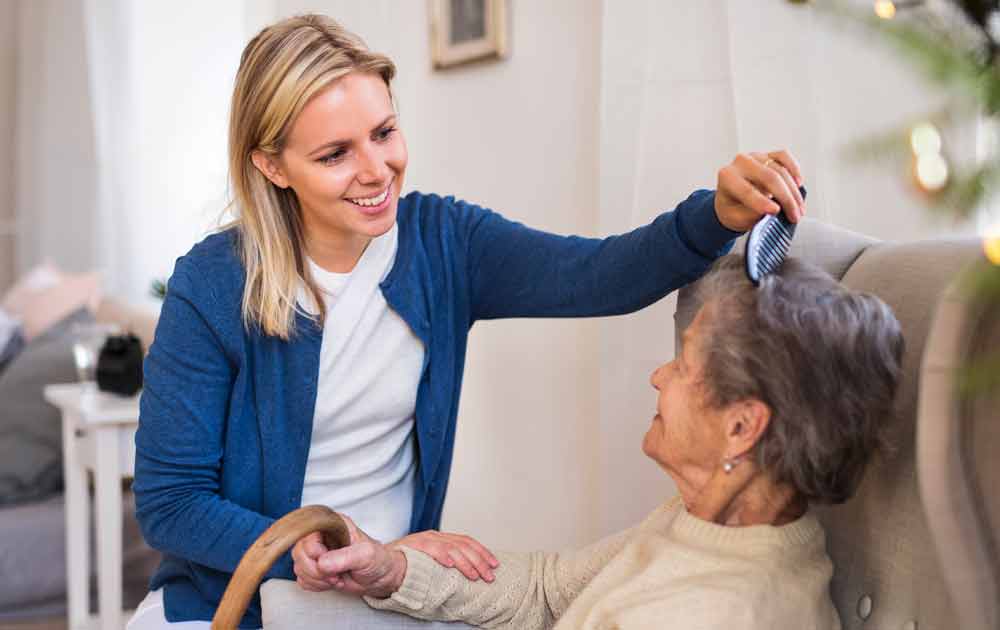
Director Series 2: Residential Care with Arda Kardjian
February 9, 2022
Osteoporosis Meds: Reducing the Risk of Pain and Fractures in Seniors
April 5, 2022How to Recover From Caregiver Burnout: 5 Tips to Reduce Stress
Table of contents
- What causes caregiver burnout?
- What are the signs of caregiver burnout?
- How to recover from caregiver burnout?
According to the National Alliance for Caregiving and AARP, there are an estimated 44 million adults in the United States providing unpaid care to older adults and people with disabilities living in the community every year.
Very few of these caregivers received any training for this role, and most are provided very little support. They often provide intense care to others while juggling their own health, the needs of children and spouses, and work outside the home.
It’s not surprising that many caregivers have no energy leftover for themselves and are at risk for caregiving fatigue. Here are some ways that you can recognize and recover from caregiver burnout.
What causes caregiver burnout?

The term “burnout” was first coined by the American psychologist Herbert Freudenberger in the 1970s. He used it to describe the effects of severe stress and high ideals in what he called “helping professions,” such as healthcare.
Now we know that burnout can occur in any type of workplace and even among unpaid caregivers.
The root causes of caregiver burnout are similar to those experienced by paid healthcare professionals with the added stress of a personal connection to the loved one you care for:
- Experiencing heavy workloads and emotional demands
- Balancing the sometimes conflicting needs of the care recipient, others around you, and yourself
- Lack of resources
- Role confusion (taking on what can feel like a parenting role to your parent or spouse)
- Unreasonable expectations from other family members
- Lack of privacy when caregiving leaves you little time to be alone
- Feeling like you don’t have the needed skills to manage the care you provide
- Feeling like you aren’t making a difference when your loved one has a progressive illness
What are the signs of caregiver burnout?

It can be easy to get so focused on caring for your loved one and taking care of all the other responsibilities in your life that you don’t realize your physical health and well-being are starting to suffer.
Caregiver burnout is a slow process, but here are some signs to watch out for. That way, you catch burnout before it starts and reach out for help.
Symptoms of caregiver burnout include:
- Feeling constantly anxious or overwhelmed
- Sleeping too much or not enough
- Trouble concentrating
- Having frequent headaches, pain, or illnesses
- Becoming easily irritated or angry
- Losing interest in activities that you used to enjoy
- Self-medicating with food, alcohol, smoking, or drugs
- Feeling impatient or resentful with the person you care for
- Feeling hopeless or helpless
Research shows that caregivers generally suffer higher levels of depression, stress, and frustration. Female caregivers comprise about two-thirds of all unpaid caregivers and fare even worse.
Too much stress over a long period can harm your health. You’re more likely to not get enough sleep or exercise or eat a balanced diet. This increases your risk of medical problems like heart disease and diabetes.
How to recover from caregiver burnout

As a caregiver, it’s an easy trap to feel stuck in your role or helpless to change your situation for the better. That’s why it’s so important to remember that you aren’t powerless.
No matter how stressful your situation seems, there are always steps that you can take to help lighten your load. This is especially true when it comes to your state of mind.
Here are a few tips to help you recover from the effects of caregiver burnout and cultivate more happiness and hope.
1. Focus on what’s important to you; Skip the rest
There’s a lot of emphasis on projecting perfection in our culture. We feel pressure to be the ideal child, parent, spouse, or worker, but this isn’t really attainable. You can help avoid burnout by prioritizing what you and your loved one need the most and giving yourself permission to say “no” to everything not on that list.
Especially when you’re feeling stressed, it’s entirely OK to say “no” or “not right now” to tasks that drain you.
Don’t pressure yourself to cook a homemade meal every night, host holiday get-togethers, or have the most beautiful garden on the block. Instead, focus on basics and activities that help you rest and recover.
2. Develop your own personal health routine and stick to it
Caregivers, especially female caregivers, are conditioned to put others’ needs before their own. This can make it easy to forget about your own health when you’re busy caring for someone else. It’s a cliche, but there is a reason that airlines tell you to put your own oxygen mask on before helping others.
Take care of yourself first by developing simple routines to ensure that you’re getting adequate sleep, water, and exercise throughout your day. Make a plan to catch up and stay caught up on your recommended health screenings and check-ups.
You’ll be a more effective and less stressed caregiver if you make taking care of your own health a priority.
3. Create your own support system
A person can rarely accomplish everything on their own. Tapping into the network of friends, family, and neighbors around you can help to lighten your own load. Many towns have networks of volunteers that help seniors and their caregivers with errands or light maintenance.
Don’t discount friends and family that live outside your area or otherwise can’t help with hands-on care. You can still delegate tasks to them that can be done online or over the phone.
Why not ask a helpful friend or family member out of state to search online for available services and make you a list of what appears promising? Once you pick the ones that would be most helpful, they can also assist with applications and coordination from afar.
4. See if your loved one qualifies for home healthcare
Ask your loved one’s healthcare provider if they qualify for home healthcare services. This service provides medical care in your home to people who have suffered an illness or injury. Home healthcare services are provided by registered nurses (RN), licensed practical nurses (LPN), physical therapists (PT), or occupational therapists (OT).
Some of the services that a home health clinician can assist your loved one with include:
- Physical Therapy
- Occupational Therapy
- Speech Therapy
- IV Therapy
- Injections
- Wound Care
- Pain Management
- Chronic Disease Management (E.g., Diabetes, High-Blood Pressure)
- Nutritional Counseling
- Fall Prevention Exercises
This can give you a temporary respite from performing this care yourself and let a trained professional address some of the difficulties you might face providing care in your home.
Since home healthcare services are ordered by a medical provider to treat a medical condition, they are typically covered by insurance or Medicare.
5. Consider a senior caregiver
Senior caregivers, home health aides, or home care workers assist elderly or disabled patients in performing the typical daily living activities within their homes. You can delegate many of the tasks you have been performing yourself as an unpaid caregiver.
Some of the tasks that a home care worker can assist with include:
- Bathing, showering, and grooming
- Cooking and grocery shopping
- Transportation
- Exercise
- Medication management
- Companionship
You can take advantage of having an experienced professional safely caring for your loved one while you rest or take care of your own self-care needs. By using an agency, you can have someone come to your home as much or as little as you need.
How long does caregiver burnout last?
Unfortunately, there’s no one answer to how long feelings of burnout will last. Caregiver burnout results from the stress built up over months and even years. It rarely comes on suddenly and won’t leave that way either.
If you can get the support you and your loved one need, it will get better, though.
Life may need to look a little different in the future. You may even find that you don’t want certain aspects to go back to how they were. After all, that’s what stressed you out in the first place.
The most important thing to know is that caregiver burnout can get better, and you are not alone.
We see you and everything you do to make your loved one’s life better. We’re here to help you if you need it!

